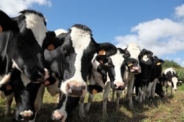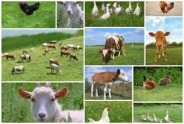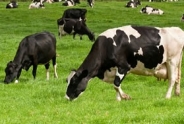How to Respond to the Media in a Crisis, Part 3
Libby Eiholzer, Bilingual Dairy
Northwest New York Dairy, Livestock & Field Crops

If you aren't ready to respond immediately, that's OK. Tell the reporter you are busy and ask if you can call them back in fifteen minutes or set up a later time to conduct the interview. Remember that reporters work on very tight deadlines and may be unwilling to put the interview off too long, but even a few minutes to collect your thoughts can help you prepare.
If you are being interviewed by radio or television reporters, chances are that only a fraction of what you say will actually be aired. Most news stories are only about 90 seconds long! With that in mind, make sure to lead with the most important thing that you want to get across-- your key message. Try to organize your overall message into no more than three main points. Research shows that in general people can only remember three messages at a time during a crisis, so establishing this format from the beginning will increase the likelihood of getting your message across.
During the interview, your goal is to create trust with listeners. Starting the interview by showing empathy for anyone negatively affected by the crisis and expressing how much you care about your animals, employees, the environment and/or the consumers can go a long way in swaying the listener to believe your message. Your next step is to tell the listeners what your farm is going to do in response to the crisis. Action steps make people feel better and will further your intent to create trust.
A few more tips:
- Body language is important! If you don't look like you mean what you are saying, then nobody is going to believe you. Just be genuine.
- If the interviewer takes the conversation in a direction that you aren't comfortable with, remember to stay calm and stick with your key message. Don't be afraid to say that you don't know, and never say "no comment" -- that always make you look guilty. Instead, explain why you can't answer.
- Repeat your key message more than once, and be ready to summarize it at the end of the interview.
Sources: "Telling Your Story: Talking About Animal Care." Presentation by Beth Meyer, ADADC. January 20th, 2016. WCDI Animal Welfare Course.
Upcoming Events
2026 Soybean & Small Grains Congress
February 11, 2026
Henrietta, NY
Participant Registration for the 2026 Soybean & Small Grains Congress NOW OPEN!
2026 Forage Congress
March 12, 2026
Nunda, NY
Due to the unprecedented winter storm that recently impacted travel conditions across the region and U.S., combined with extreme cold temperatures and associated safety concerns, Forage Congress was postponed out of an abundance of caution. This decision was made with the safety of our participants, speakers, staff, and venue partners as the highest priority.
We are pleased to officially announce that Forage Congress has been rescheduled for Thursday, March 12, 2026, and will be held at The Nunda Ranch as originally planned.
Address: 2278-NY 436, Nunda, New York 14517
Sponsorship opportunities, vendor participation, and event registration are now open. We are excited to reconvene this important educational program and look forward to welcoming producers, industry partners, and speakers for a full day of applied, research-based forage systems programming.
From Dry to Fresh: Transition Cow Management Training
March 12, 2026
Albion, NY
This is a 1-day hands-on training in transition cow management offered in English and Spanish.





